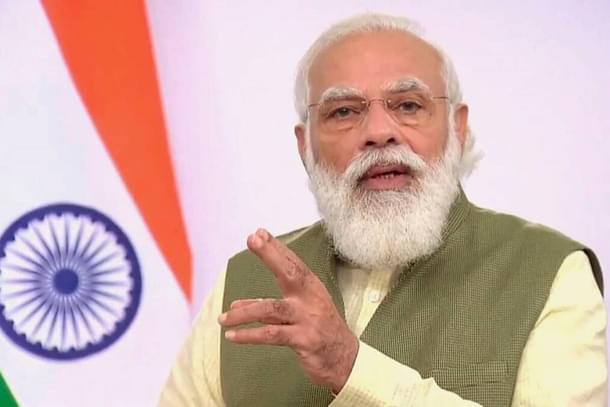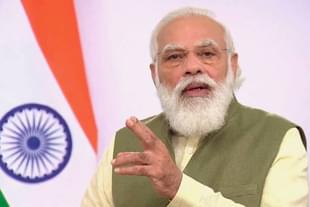Blogs
PM Modi's War On Corruption: Wielding Culture, Governance And ED As Potent Weapons
Prof. Vidhu Shekhar
Apr 02, 2024, 05:49 PM | Updated 05:49 PM IST
Save & read from anywhere!
Bookmark stories for easy access on any device or the Swarajya app.


In India, the corruption of politicians leading to jail has been an exception rather than the norm.
It took nothing less than sending cows on scooters for Lalu Prasad Yadav to end up in jail.
His first conviction took a further 17 years to arrive. And he was just one icon of corruption. The number of corrupt politicians that line up in Indian politics is quite long. Hardly many have gone to jail, though.
But that seems to be changing. It took Arvind Kejriwal less than 2 years from rolling back his troublesome liquor policy after the irregularities came to light to reach jail. For Hemant Soren, another politician and ex-chief minister, the time from the first filing of FIR to jail was similar.
Raids And Their Chilling Effect On The Corrupt
What is surprising (or maybe not) is that the opposition makes a case of "dictatorship" because the investigative agencies have become active in the country. Maybe we should ask the opposition how corruption would be controlled if investigative agencies don't become active.
Is there any other way? Especially given the judiciary, all the way to an active Supreme Court, is always available to take the government to task for illegitimate arrests and persecution.
As an illustration, there were 112 raids over the 10 years from 2004 to 2014. Just 112. For a country as large as India and ridden with scams in that era, 112 raids across the country effectively meant that nothing was being done.
As a citizen, such abysmally low numbers cannot help but raise my suspicion that it was nothing more than a political consensus of "don't raid me, I won't raid you."
On the other hand, from 2014 to 2022, there have been more than 3,000 raids by ED. This now seems like an investigative agency on the prowl for corrupt people in the vast Indian system. It sends a signal that the investigative agency is serious about catching corruption.
And the activity has shown results.
As against the attachment of proceeds of crime of Rs 5,346.16 crore and filing of 104 prosecution complaints, recovery of Rs 35 lakh in cash and zero convictions in the 2004-14 period, 2014-22 saw the attachment of proceeds of crime of about Rs 99,356 crore, filing of prosecution complaints in 888 cases, and conviction of 23 accused persons/entities and confiscation of proceeds of crime to the tune of Rs 869 crore (now Rs 2,000 crore till 2024).
Now, this is called an anti-corruption drive. We must celebrate this. UPA (United Progressive Alliance) and the opposition should learn.
For the first time, there is a start of fear build-up that the government is serious about corruption. The conviction of the corrupt not only makes one corrupt go to jail, but also makes for a chilling effect on other corrupts — their time can also come.
It starts changing the society from where honest suffered to one where corrupts run scared.
Opposition Targeted?
The opposition argues that this increase in raids is solely due to the government targeting its opposition.
However, the data contradicts this claim as of the more than 7,000 cases with ED, less than 3 per cent pertains to politicians and political corruption. Even in political corruption cases, where the opposition often claims that the ED is being selectively used against them, a closer examination reveals another story.
During the UPA era, nearly 50 per cent of the politicians under ED investigation were from the ruling government.
If we accept the opposition's assumption that a government would try to protect its own members, yet still find about 50 per cent of them implicated in ED cases, it raises the question — how many more members of the UPA were involved in corruption?
It is then not surprising that when the government changed, a large majority of those being investigated are from the former government, now in opposition.
It is crucial to recognise that the ED's actions are not mere political theatrics. All the raids have yielded substantial cash seizures, and the Supreme Court has also not been lenient with the politicians involved, often denying them bail.
This indicates that the government's investigative agencies are operating based on concrete evidence, rather than targeting specific individuals.
Culture Change, Not Washing Machine
This brings us to another accusation of the opposition: That BJP acts as a washing machine, wherein those who join BJP become non-corrupt and cases are dropped. Some analysts also call this 'Congressification' of BJP, for several ex-Congress/UPA politicians have joined BJP.
But this ignores one of the fundamental arguments about the power of institutional culture. Peter Drucker famously said that "culture eats strategy for breakfast," indicating the transformative impact of ingrained ideologies and practices within any organisation.
When leaders or members from different political backgrounds join the BJP, they are not merely switching parties; they are assimilating into a distinct cultural and ideological ethos.
This transition results in them adopting the party's core values and work ethics. As such, this is no Congressification of BJP, but the former 'Congressis' become 'BJPians', aligning their actions and beliefs with their new political home, potentially leading to a natural decline in corrupt practices.
It is a well-acknowledged principle in organisational behaviour that the tone at the top dictates the ethical climate of the entire hierarchy.
A leader's integrity and commitment to anti-corruption can cascade down the ranks, creating a ripple effect that reduces malpractices at all levels.
The internal control of a government that provides good governance must come via internal culture and top leadership rather than investigating agencies.
Ideology Matters: Corruption In Non-ideological And Family-Ruled Parties
There is one additional important reason why several opposition politicians are in corruption cases and scandals. Parties that prioritise power over ideology or are dominated by family dynasties are more prone to corruption.
When gaining and maintaining power becomes the sole objective, self-interest and personal enrichment often follow.
In contrast, parties driven by strong ideologies, such as the BJP's ideology of nationalism, view power as a means to achieve a greater purpose. This ideological foundation acts as a safeguard against the temptations of corruption.
Given the opposition's lack of clear ideology and the prevalence of family rule, it is unsurprising that a higher proportion of their politicians face corruption charges. It must again be noted that most ED cases (more than 95 per cent) and raids are of non-political entities, undermining accusations of political bias.
All in all, PM Modi's anti-corruption crusade is not only removing the rot from the current political class but also setting a powerful precedent for the future.
By creating a chilling effect on corrupt practices and fostering a culture of accountability, the government is paving the way for cleaner governance. Honesty should no longer be seen as a disadvantage in politics; instead, corruption should be treated as the unacceptable offense it is.
As the Modi government continues its relentless pursuit of corruption, the opposition's accusations ring hollow. It is no wonder that citizens and supporters ignore such desperate calls of the opposition of dictatorship.
Prime Minister Modi's anti-corruption drive, propelled by the ED and his governance ethos, represents a watershed moment in Indian politics. It is a testament to the transformative power of a resolute ideology and a culture that places national interest above personal gain.
As the battle against corruption rages on, it is time for India to rally behind this noble cause and usher in an era of transparency and good governance.
Dr. Vidhu Shekhar holds a Ph.D. in Economics from IIM Calcutta, an MBA from IIM Calcutta, and a B.Tech from IIT Kharagpur. He is currently an Assistant Professor in Finance & Economics at Bhavan's SPJIMR, Mumbai. Previously, he has worked as an investment banker and hedge fund analyst. Views expressed are personal.





